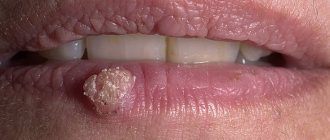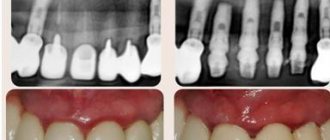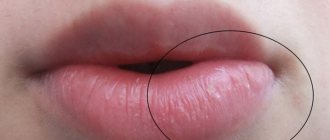- Physiological reasons
- Dental reasons
- Paresthesia of the lips due to damage or inflammation of the trigeminal nerve
- Numbness due to migraine with aura
- Numb lips due to stroke
- Numb lips due to diabetes
- Numb lips due to allergies
- Shingles
- Neuroses and multiple sclerosis
- Anemia
- Diagnosis and treatment
Lip paresthesia (numbness) is a condition in which tissue sensitivity decreases or disappears.
This process may be accompanied by tingling or other sensations. Numbness of the lips occurs for physiological reasons and is one of the symptoms of a certain pathology. First of all, it is necessary to pay attention to the frequency of occurrence and duration of this condition, its spread to other parts of the face and body. Lips may go numb in people who suffer from neurological and dental diseases, diabetes, anemia, allergies and a number of other diseases. If the symptom occurs frequently, an examination by a dentist and neurologist is recommended to determine the exact cause of the numbness.
Physiological reasons
Tissue sensitivity may decrease upon contact with very hot or cold food or drinks. This happens when a person eats ice cream, drinks tea or coffee that is too hot, or eats too spicy food. A similar phenomenon is observed outside in cold weather. The skin of the lips becomes chapped, cracks appear, and sensitivity decreases. Physiological numbness in most cases does not cause harm to health. As soon as contact with the irritant ceases, tissue sensitivity is restored.
To avoid the negative consequences of low-temperature exposure, you should use lipsticks and balms that will protect the skin from chapping and painful cracks.
Another possible cause of tissue numbness is cosmetic and cosmetic procedures. For example, lip products with red pepper extract may cause a slight burning sensation or numbness of the tissues. Some women experience a decrease in lip sensitivity after tattooing if the procedure was performed incorrectly or the wrong lip care was chosen after it.
Inflammatory process on the root of the tooth
If you are wondering why the lower jaw is numb, then the first thing you need to pay attention to is the condition of the oral cavity. An unpleasant symptom can be caused by dental diseases such as periodontitis and a cyst on the root of the tooth. Then, in addition to discomfort, a slight tingling sensation may be observed in the jaw and chin area, as well as pain when pressing or chewing food on the causative tooth.
The photo shows a cyst
Dental reasons
When treating teeth and performing some types of cosmetic procedures, local anesthesia is used, which reduces the sensitivity of tissues. During the period of action of the drug, lips, cheeks, and other areas of the face become numb. After completion of the therapeutic manipulations, sensitivity is restored on its own.
Numbness of the lips and tongue is accompanied by inflammatory processes in the oral cavity. This happens with gingivitis, periodontal disease, and purulent lesions. Soft tissues are involved in the pathological process, which causes swelling and impaired receptor sensitivity.
Keeping the head and neck in an unnatural position for a long time
Impaired blood circulation and circulation, compression of nerve endings and, as a result, numbness of the jaws and other areas of the face, can be caused by spending a long time at the computer. Especially when a person props his cheek or chin with his hand. The problem often occurs in people who have an uncomfortable pillow or mattress, sleep in one position for a long time or stay in one position.
After being in an uncomfortable position for a long time, this symptom may occur.
Usually, an unpleasant symptom goes away almost immediately after eliminating the irritating factor or doing a little warm-up.
As you can see, there are many reasons why the upper and lower jaw become numb. Some of them are very dangerous. Therefore, if an unpleasant symptom accompanies you for a long time and appears frequently, then you should consult a doctor. It is best to start the examination with a dentist, but in the future you may need the help of a cardiologist, neurologist, endocrinologist, oncologist, psychotherapist and other specialists.
Notice
: Undefined variable: post_id in
/home/c/ch75405/public_html/wp-content/themes/UltraSmile/single-item.php
on line
45 Notice
: Undefined variable: full in
/home/c/ch75405/public_html/wp-content /themes/UltraSmile/single-item.php
on line
46
Rate this article:
( 4 ratings, average: 4.25 out of 5)
prevention
- Osmanova Z.Kh., Salikhova A.A. Possible postoperative complications when using dental implants // Bulletin of medical Internet conferences. – 2022.
- Marine M.T. [and others] Neuropathy of the trigeminal nerve after surgical interventions in the maxillofacial region // Nervous diseases. – 2022.
Consulting specialist
Orlova Elena Vladimirovna
Doctor rating: 9.5 out of 10 (2) Specialization: Dentist-therapist Experience: 33 years
Numbness due to migraine with aura
Migraines with aura are attacks of severe headaches, which are preceded by impaired tissue sensitivity, visual disturbances (spots and “floaters” before the eyes), and speech impairment.
Patients with the neurological disease experience temporary numbness of the lips and sometimes half of the face. In some cases, the sensitivity of the upper limb may decrease. In addition to these symptoms, migraine with aura is accompanied by severe headache, which is pressing or throbbing in nature, dizziness and nausea.
Comments
And if not the whole jaw is numb, but only its left half, and everything that is there: part of the lip, part of the cheek, teeth. Sensitivity disappeared completely. What could it be?
Svetlana (05/19/2020 at 15:14) Reply to comment
- Dear Svetlana, there can be a lot of reasons, ranging from a pinched nerve, ending with a mini-stroke, multiple sclerosis. If you experience similar symptoms, you need to call an ambulance.
Editorial staff of the portal UltraSmile.ru (05.24.2020 at 09:18) Reply to comment
Write your comment Cancel reply
Numb lips due to diabetes
For patients with diabetes, it is important to control blood glucose levels and avoid sudden increases or decreases in sugar. Lips may become numb due to hypoglycemia - a decrease in glucose levels below 2.8 mmol/l. This happens when you take too high a dose of insulin or violate your diet or skip meals.
In addition to numbness of the lips, the patient experiences severe weakness, tremors in the limbs, rapid heartbeat, and excessive sweating. In severe cases, hypoglycemia leads to loss of consciousness and coma. To eliminate this dangerous condition, you need to eat something sweet with quickly doubling carbohydrates. If the patient is unconscious, intravenous glucose and glucagon injection are required.
The fetoplacental system is like a new endocrine gland
After implantation of the zygote in the uterine cavity, a new endocrine gland begins to form in the woman’s body - the placenta (baby place).
The placenta has two parts: fetal and maternal, the blood circulation of which never mixes. These parts of the placenta are as close as possible, which allows for the exchange of substances between the body of the mother and the fetus, i.e., in essence, allows the child to “eat, write and breathe,” and, therefore, grow and develop.
Metabolism between the mother and fetus is the main factor for its development. The exchange is carried out due to the permeability of the placenta, which is disrupted in most acute and chronic complications during pregnancy. Violation of the integrity of parts of the placenta and deterioration of its permeability leads to fetal death and termination of pregnancy.
The death of the fetus and termination of pregnancy is also possible for another reason, when the mother’s body suddenly decides that the fetus is a foreign protein for it. But this is actually true. However, nature has provided a protective mechanism that does not allow the mother's immune system to recognize antigens of paternal origin embedded in the child.
This protective mechanism consists of certain factors that block the mother’s immune system and provide local immunological comfort. With spontaneous abortions, blocking factors in the mother's blood are reduced or absent.
The placenta produces a wide range of hormones and specific proteins that enter the mother's blood and amniotic fluid. They regulate the normal course of pregnancy and fetal development by changing the function of other endocrine glands and life support organs in general.
By the level of hormones and specific proteins of the placenta, determined in the mother’s blood, in the fetal blood or in the amniotic fluid, the condition of the fetus and the function of the placenta can be assessed, which is what obstetric endocrinology deals with. Thus, studying the endocrine function of the fetoplacental complex can significantly improve the diagnosis of the fetal condition at different stages of pregnancy.
The appearance of a new endocrine gland leads to other changes in the female body.
The appearance of a woman changes. Appears:
- pigmentation of the skin (forehead, cheeks, chin, upper lip, white line of the abdomen, nipples and parapapillary zones), which is associated with significant stimulation of pigment formation by skin cells. The formation of pigment depends on the melanoform hormone of the adrenal gland, increased production of which occurs during pregnancy;
- low-grade body temperature is noted , which can last up to 16-20 weeks of pregnancy and is associated with hormonal fluctuations.
From the moment the placenta begins to produce progesterone, the temperature decreases and returns to normal.
- There is engorgement and soreness of the mammary gland due to an increase in its volume as a result of the proliferation of glandular tissue, enlargement of the nipples and protrusion of the areolar glands. In the second half of pregnancy, colostrum may be released;
- violation of facial proportions (enlargement of the nose, lips, chin, thyroid gland, especially in the second half of pregnancy), some enlargement of the limbs;
- stretching of the tissues of the anterior abdominal wall , mammary gland, thighs and the appearance of striae (“pregnant stripes”) in these areas (stria gravidarum). Their occurrence is associated with excessive stretching of the abdominal wall; this is more often observed in persons with a large abdominal volume (large fetus, polyhydramnios, multiple pregnancy) or with some lack of elastic fibers in the skin;
- varicose veins worsen or appear for the first time , especially in the lower extremities;
- The “proud posture and gait” of a pregnant woman is caused by a shift in the center of gravity of the body , increased mobility of the pelvic joints and limited mobility of the hip joints.
- Progressive increase in body weight , which is caused both by the growth of the fetus and uterus, and by the characteristics of metabolic processes and fluid retention in tissues. The average weight gain during pregnancy is 10-12 kg, of which 5-6 kg is due to the fertilized egg (fetus, placenta, amniotic fluid), 1.5-2 kg for enlarged uterus and mammary glands, 3-3.5 kg - to directly increase a woman’s body weight.
Before childbirth (3-4 days), a pregnant woman’s body weight drops by 1.0-1.5 kg, due to the peculiarities of metabolic processes.
Diagnosis and treatment
Numbness of the lips itself occurs only for physiological reasons and does not require treatment. In other cases, patients note other signs of pathology: pain, weakness, dizziness, etc. Based on these, the cause of the sensitivity disorder can be determined and a treatment regimen can be selected. To make an accurate diagnosis, you need to consult a therapist, dentist or neurologist.
If inflammatory processes or tumors in the oral cavity are suspected, an x-ray is prescribed.
For neurological pathologies, CT and MRI are used to make a diagnosis. Laboratory tests help confirm or exclude the presence of diabetes and anemia. To get rid of numb lips, you need to eliminate the underlying cause. To do this, patients are prescribed drug therapy that effectively combats the symptoms of the disease. For tumors, fractures or injuries of the jaw, pulpitis, abscesses, and strokes, surgical treatment is required.
Surgical intervention
Some patients report that their upper or lower jaw goes numb after undergoing the following dental procedures:
- tooth extraction: most often, an unpleasant symptom occurs after a complex removal of third molars, accompanied by drilling of the roots, peeling of the soft gum tissue and suturing,
- vestibuloplasty,
- trimming the frenulum of the tongue,
- bone tissue augmentation surgery: sinus lift and bone grafting,
- implantation1: especially when a large number of teeth were restored at once,
- opening and removal of cysts, granulomas, abscesses.
This condition can occur after surgery.
Why does the jaw go numb in the above cases? This may be a normal reaction of the body to nervous and physical stress, surgery, tissue injury and capillary damage. Most often, the symptom is associated with compression (squeezing) of nerve endings due to the formation of physiological edema that occurs after surgical procedures. Normally, the numbness should go away within a week after the intervention, but if it persists longer, it may indicate other problems. Read on!











